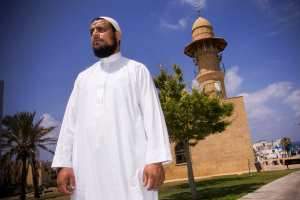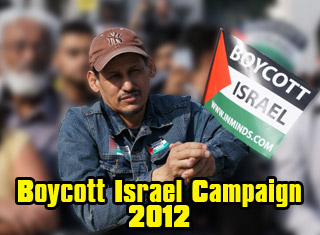
 Innovative Minds © 2014. All Rights Reserved. www.inminds.co.uk | |||||||
Israel's secret police vet candidates for imamJonathan Cook Job interviews for the position of imam at mosques in Israel are conducted not by senior clerics but by the Shin Bet, Israel’s secret police, a labor tribunal has revealed.  Sheikh Ahmed Abu Ajwa has been preaching at Jabalya mosque since he was 19 At a hearing last month, a senior government official admitted that 60 undercover inspectors were employed effectively as spies to collect information on Muslim clerics, reporting on political opinions they expressed in sermons and relaying gossip about their private lives. Sheikh Abu Ajwa took his case to the tribunal after the Shin Bet rejected him three years ago as the imam of a mosque in Jaffa, next to Tel Aviv, despite his being the sole candidate. He was told after a security clearance interview that his views were “extremist” and too critical of Israel, even though an imam is not officially defined as a security-related position.
The traditional independence of the local Islamic authorities was removed at Israel’s creation in 1948, when the government confiscated almost all Waqf property -- endowments of land and property used for the benefit of the Palestinian Muslim community -- removing the main source of income for clerics, the Islamic courts and charitable services.
“During one interview with the Shin Bet, they told me they had been collecting information on me since I was 15,” Sheikh Abu Ajwa said. “I am the first imam ever to challenge the Shin Bet’s role in our appointments. It’s important to win a precedent-setting ruling from the courts to stop this kind of interference.” Michael Sfard, a human rights lawyer representing Sheikh Abu Ajwa, said that, as far as it could be determined, no similar vetting of rabbis took place before their hiring. “This sort of surveillance relating to a non-security position like an imam comes straight out of the era of the Stasi police in East Germany or the McCarthy period in the United States,” he said. The traditional independence of the local Islamic authorities was removed at Israel’s creation in 1948, when the government confiscated almost all Waqf property -- endowments of land and property used for the benefit of the Palestinian Muslim community -- removing the main source of income for clerics, the Islamic courts and charitable services. According to experts, as much as a fifth of Palestine’s cultivated land was Waqf property before 1948. Israel passed most of it to Zionist organizations like the Jewish National Fund or sold it to developers. Responsibility for hundreds of mosques, cemeteries and other holy sites, meanwhile, was handed either to the religious affairs ministry or to Islamic boards of trustees appointed by the government. Today, most imams and all Islamic judges must submit to a security clearance interview before being awarded a state salary. Israel’s Palestinian minority, one fifth of the population, have long charged that many of its Muslim leaders are little more than government placemen, whose Islamic learning takes second place to their co-operation with the authorities.
Israel’s Palestinian minority, one fifth of the population, have long charged that many of its Muslim leaders are little more than government placemen, whose Islamic learning takes second place to their co-operation with the authorities.
Sabri Jiryis, a historian of Israel’s early years, has noted that the boards of trustees repeatedly rubber-stamped government decisions to sell off Islamic property to developers. Most notoriously Jaffa’s board approved in 1971 selling an Islamic cemetery in Tel Aviv on which the Hilton hotel was built. Sheikh Abu Ajwa said: “In Jaffa, the government appointed many clerics because they had proved their loyalty, though not to other Muslims. They sold off our property -- but you can’t sell what belongs to Allah.” Jaffa, which was once the commercial capital of Palestine, today has a population of nearly 50,000 residents, of which two thirds are Jewish and the rest Muslim. The sheikh has been preaching at the seafront Jabalya mosque, one of six in the town, since he was 19, making him reportedly the youngest person to serve as an imam in Israel’s history. He qualified as an imam at an Islamic college in the Israeli Palestinian city of Umm Al-Fahm in 1998. The local community universally backed him as the new imam when his predecessor retired three years ago, but he cannot be officially recognized, and is ineligible for a salary, without the interior ministry’s approval. As part of his application, he was interviewed by a Shin Bet officer named “Dror” who, he said, waved at him a folder of confidential information collected by undercover inspectors. “We will decide who is the next imam,” Dror told him, according to Sheikh Abu Ajwa. The sheikh was asked mainly about his political opinions and demonstrations he had attended. The Shin Bet’s assessment, revealed to the tribunal, was that Sheikh Abu Ajwa’s appointment “may jeopardize security and peace in Jaffa”. In addition, the agency told the Haaretz newspaper that the sheikh "has had a long involvement in hostile activity, which manifested itself in incitement against the state and its Jewish citizens." Sheikh Abu Ajwa said this was a reference to his position as the leader in Jaffa of the popular northern wing of the Islamic Movement. Its leader, Sheikh Raed Salah, has raised the hackles of Jewish officials both by running a campaign warning of Israel’s intentions to take over the Al Aqsa mosque compound in Jerusalem and by promoting a boycott of parliamentary elections. The head of the Shin Bet, Yuval Diskin, warned in 2007 that his agency’s role was to prevent any activities, including democratic ones, that worked against the interests of a Jewish state. Yaakov Salameh, the head of the religious minorities department at the interior ministry, told the tribunal last month that his inspectors collected information on Muslim religious leaders, including rumors about their private lives, such as whether they had had an affair or beat their children. The information was then handed to the Shin Bet, which assessed whether they were suitable to be appointed. Sfard said it was an “extraordinary” admission, given that under Israeli law the criminal records of candidates for religious appointments could only be considered if the applicant agreed to the information being handed over. David Baker, a spokesman for the prime minister’s office, which is responsible for the Shin Bet, refused to comment on whether the appointment of rabbis followed the same procedures as those for imams. Sheikh Abu Ajwa observed that many rabbis, particularly those in the settlements, said “very extreme things but no one spies on them. In fact, they have full government support.” He admitted he was outspoken in his sermons, but said he had never broken any laws and never advocated violence. “I talk about our Palestinian identity and criticize the policies of the state in its treatment of us as a minority,” he said. “These are very sensitive things that they want to prevent us from talking about.” During one Shin Bet interview, he said, he had been told: “We know everything about you, we are always watching you.” The goal of such interviews was often to recruit Muslim clerics to become informers themselves, he added. Source: http://www.maannews.net/eng/ViewDetails.aspx?ID=281809 Comment: Interesting article, reminds me of a talk by Prof. Mohammadi on the Islamic Revolution in Iran, and the reasons why it succeeded - key amongst them was the economic independence of the Ulema. see A Conversation With Prof.M Mohammadi
Related ArticlesAlso Of InterestPage URL: http://www.inminds.co.uk/article.php?id=10373
|
|
Support Us
If you agree with our work then please support us.Campaigns INMINDS Facebook Live Feed Latest Video's
INMINDS Twitter Feed Tweets by @InmindsComFeatured Video's
You need Flash player 8+ and JavaScript enabled to view this video.
[all videos (over 200)..] Featured MP3 Podcast  "[Deportation at the airport] We saw the injured [Turkish] men going through.. a lot had a leg cut out of their trousers or an arm cut out of their top. It had been cut out to treat their wounds.. they were covered in blood, blood that had been there for three days, and some of them had wounds that were still bleeding.. What upset me most was seeing the dozen men, one after another, hobbling across the terminal, with a bandaged foot. I couldn't ask them why so many of them had a bandaged foot, I couldn't ask them what had happened, because if they spoke or if any of us spoke to them the Israelis beat the injured person.. We later found out that they had these injuries on the tops of their feet from when the troops came down from the helicopter on the Mavi Marmara, and they came down firing - they had been shot from above. Some of the men that were killed were shot at close range - head and chest, but a dozen of the men who were shot, among 59 people who were shot, they were shot at the tops of their feet - the bullets were coming down.. They weren't given a wheelchair or a pair of crutches, and if any of the other passengers stood up and tried to offer [help].. that person was dragged away and smacked by these Israelis. The Israeli soldiers sat on the floor, laughed and sniggered and made every one of these Turkish men hobble and hop all the way across, some 200 metres, everyone of them, one by one, made to do that purely for the sick amusement of the Israeli soldiers." Survivor of the flotilla massacre speaks candidly of her experience Ratstar Centre London, 22 July 2010 [46min / 42Mb] [all podcasts..] Newsletter Feedback |
 |
 |















































